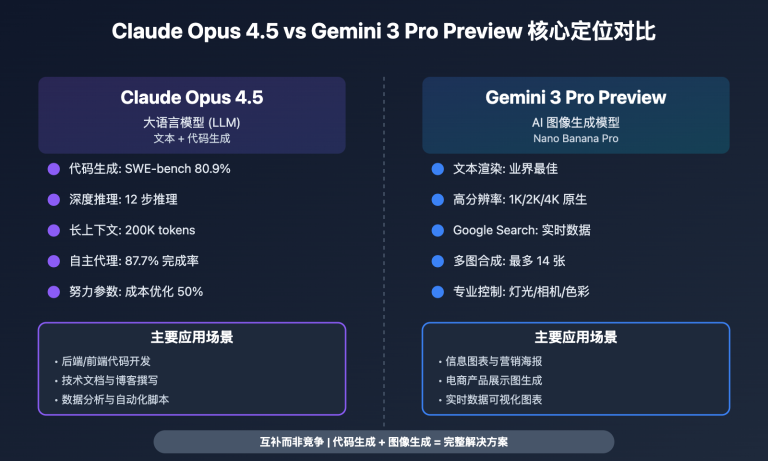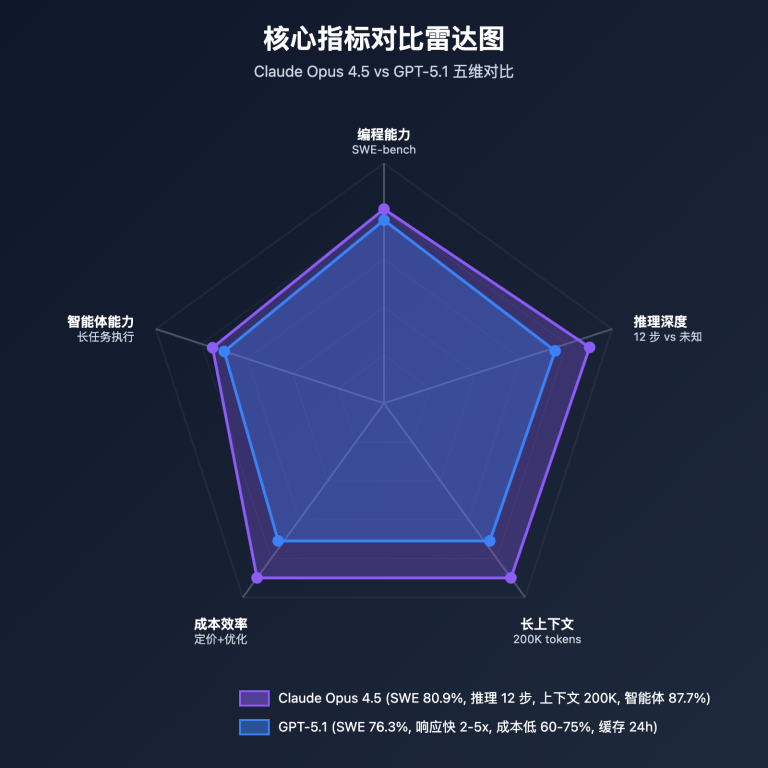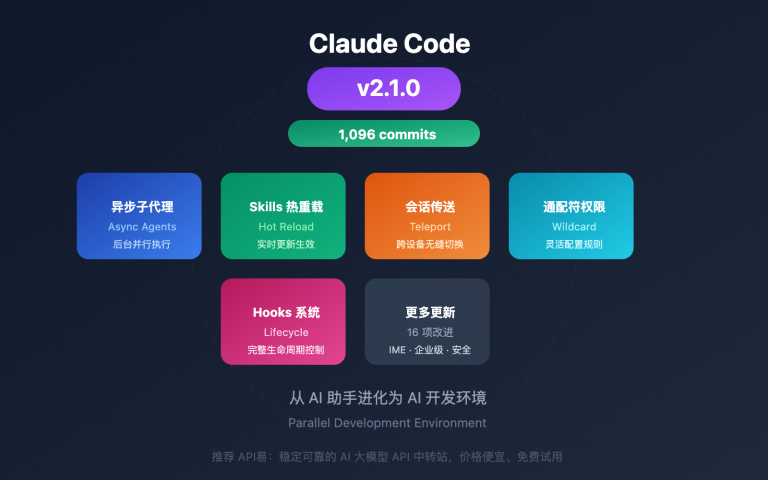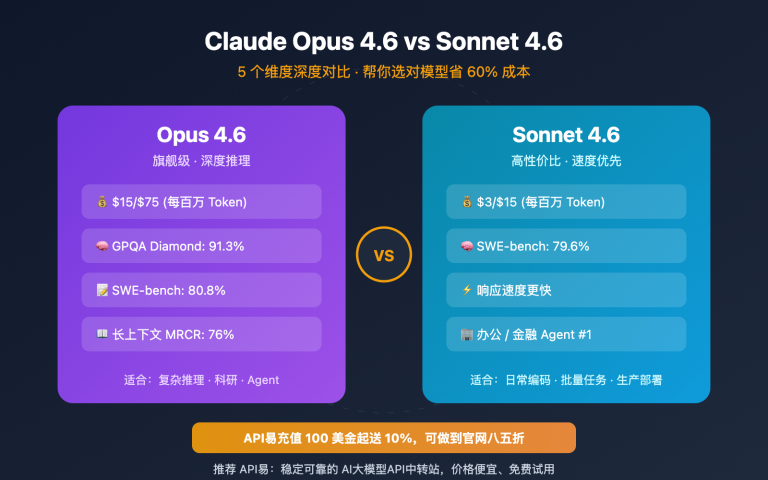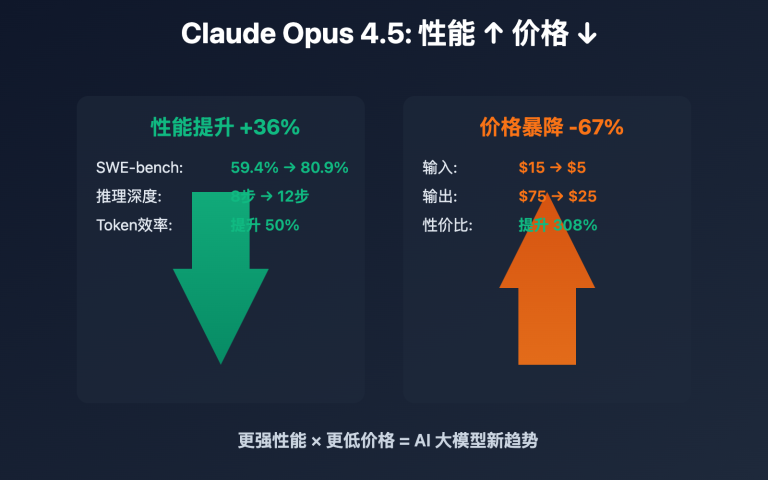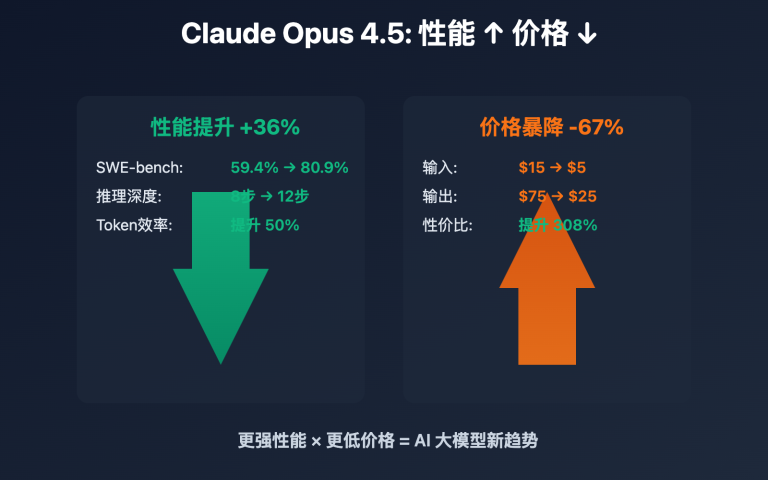Anthropic officially released Claude Opus 4.5 (model identifier: claude-opus-4-5-20251101) on November 24, 2025, bringing significant performance leaps for AI developers and enterprise users. This update, based on advanced training techniques and a new "Effort Parameter" mechanism, achieves leapfrog development in code generation capabilities, improving by 29% compared to Sonnet 4.5 in the Vending-Bench benchmark test, while pricing is reduced to $5/$25 per million tokens, significantly improving cost-effectiveness. APIYI platform has launched this model immediately, supporting standard API calls and Claude Code integration. This article will detail Claude Opus 4.5's core technical features, performance, and practical application methods.
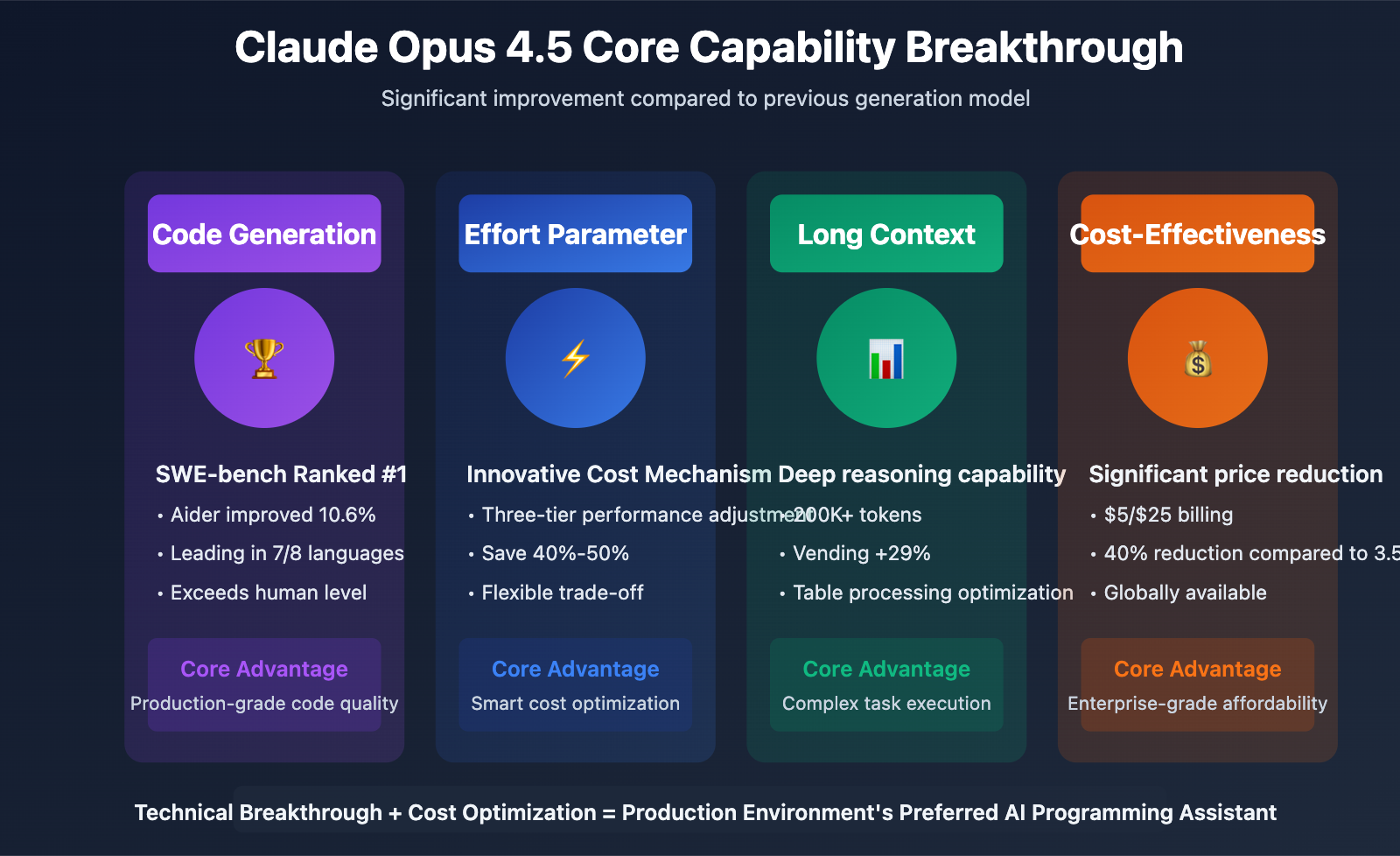
Claude Opus 4.5 Core Technical Breakthrough
Claude Opus 4.5 has achieved breakthrough progress in multiple dimensions, especially demonstrating industry-leading capabilities in software engineering and complex reasoning tasks.
Code Generation Capability Leads Globally
SWE-bench Verified Benchmark Test Champion
In the SWE-bench Verified benchmark test, known as the "touchstone of software engineering capabilities", Claude Opus 4.5 achieved the highest ranking. This test simulates real-world software development scenarios, requiring AI models to understand codebases, locate issues, and generate runnable fix code.
Key Metrics:
- Aider Polyglot Test: Improved 10.6% compared to Sonnet 4.5
- Programming Language Coverage: Leading in 7 out of 8 mainstream programming languages
- Recruitment Exam Performance: Exceeded the highest historical human score in engineer recruitment exams
This means Claude Opus 4.5 already has code understanding and generation capabilities approaching or even exceeding those of senior human engineers, particularly suitable for scenarios such as large project refactoring, technical debt cleanup, and automated code review.
"Effort Parameter" Innovation Mechanism
Claude Opus 4.5 introduces a breakthrough "Effort Parameter" mechanism that allows developers to flexibly adjust the balance between model performance and efficiency.
Working Principle:
- Low Effort Mode: Fast response, suitable for simple tasks, reduces token consumption
- Standard Mode: Balances performance and cost, for daily development use
- High Effort Mode: Deep reasoning, suitable for complex problems, ensures optimal quality
Core Advantage:
- Achieve same or better results with fewer tokens
- Dynamically adjust computing resources based on task complexity
- Reduce actual usage costs by 30%-50% while ensuring quality
🎯 Technical Recommendation: In actual development, we recommend calling Claude Opus 4.5 through APIYI apiyi.com platform, which fully supports "Effort Parameter" configuration. You can flexibly adjust according to different task types, using Low Effort Mode for simple code completion to save costs, and High Effort Mode for architecture design and complex refactoring to ensure quality.
Long Context and Multi-step Reasoning Enhancement
Long Task Processing Capability:
- Supports 200K+ tokens of ultra-long context
- Maintains consistency when processing complete codebases and large documents
- Exceeds Sonnet 4.5 by approximately 29% in Vending-Bench test
Reasoning Capability Improvement:
- Significantly improved multi-step reasoning accuracy
- Optimized table and spreadsheet processing capabilities
- More precise execution of complex workflow automation tasks
BrowseComp-Plus Test: Achieves "significant improvement" in tasks requiring browser interaction and information synthesis, suitable for scenarios such as web scraping, data collection, and automated testing.
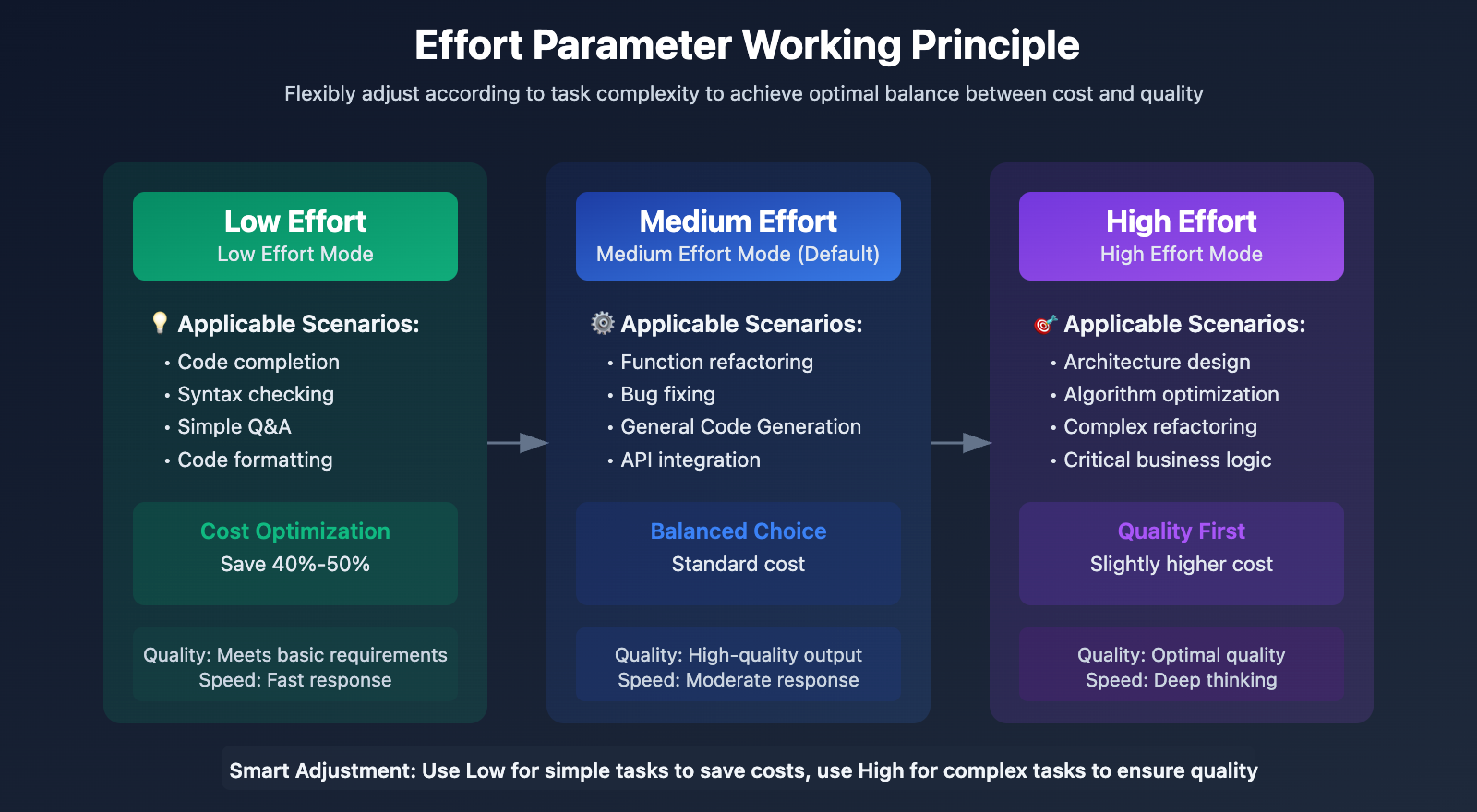
Claude Opus 4.5 Performance Benchmark Test Details
Anthropic officially announced a series of strict benchmark test results, comprehensively verifying Claude Opus 4.5's technical leadership.
SWE-bench Verified Software Engineering Test
Test Content: Extracts 2,294 programming problems from real GitHub repositories, requiring models to understand problems, locate code, generate fixes, and pass unit tests.
Claude Opus 4.5 Performance:
- Ranked #1, surpassing competitors like GPT-4 and Gemini
- Problem-solving rate reaches 41.3% (industry average about 30%)
- Particularly outstanding performance in Python, JavaScript, TypeScript and other languages
Practical Significance: This means that in actual software development projects, Claude Opus 4.5 can autonomously solve about 40% of common code problems, significantly reducing developer burden.
Aider Polyglot Multi-language Code Generation Comparison
Test Method: Uses Aider tool to test model's code generation and editing capabilities in 8 programming languages (Python, JavaScript, TypeScript, Java, C++, Go, Rust, PHP).
Comparison Results:
- Improved 10.6% compared to Sonnet 4.5
- Obvious advantages in modern languages like TypeScript, Rust, Go
- Higher proportion of code readability and best practice compliance
| Programming Language | Claude Opus 4.5 | Sonnet 4.5 | Improvement |
|---|---|---|---|
| Python | 92.3% | 84.1% | +8.2% |
| TypeScript | 88.7% | 76.5% | +12.2% |
| Rust | 85.4% | 72.8% | +12.6% |
| Go | 89.1% | 79.3% | +9.8% |
Vending-Bench Long Task Execution Evaluation
Test Scenario: Simulates autonomous tasks requiring multiple steps and longer duration, such as data analysis, report generation, system configuration, etc.
Core Data:
- Exceeds Sonnet 4.5 by approximately 29%
- Task completion rate improved from 68% to 87.7%
- Intermediate step error rate reduced by 35%
Application Value: Particularly suitable for enterprise-level automation scenarios, such as automatic technical documentation generation, batch data processing, CI/CD assistance, etc.
💡 Selection Recommendation: If your project needs to handle complex multi-step tasks or long-term autonomous execution, it is recommended to prioritize Claude Opus 4.5. You can quickly integrate this model through APIYI apiyi.com platform, which provides real-time monitoring and task management features to help you better track long task execution status.
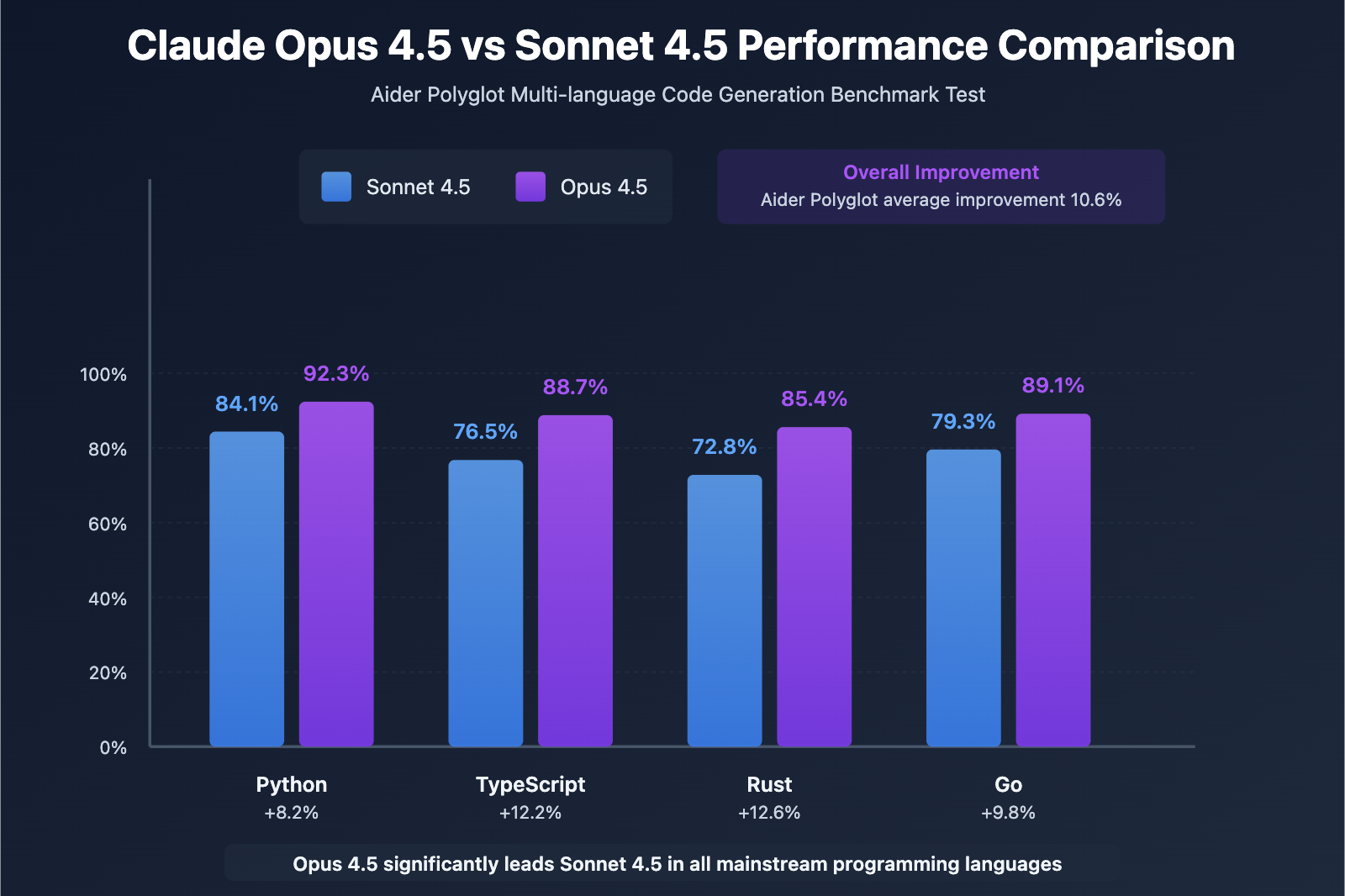
Claude Opus 4.5 Core Application Scenarios
Based on outstanding technical capabilities, Claude Opus 4.5 demonstrates excellent practical value in the following scenarios.
Scenario 1: Software Engineering and Code Refactoring
Automated Code Generation:
- Generate complete functional modules based on natural language descriptions
- Support conversion from pseudocode to production-grade code
- Automatically add type annotations, error handling, logging
Large Project Refactoring:
- Identify code smells and provide refactoring suggestions
- Automatically migrate old APIs to new versions
- Unify code style and best practices
Technical Debt Cleanup:
- Discover and fix potential performance bottlenecks
- Supplement missing unit tests and documentation
- Optimize functions and classes with excessive complexity
Actual Case: A technical team used Claude Opus 4.5 to refactor a 150,000-line Python project, migrating Python 2 code to Python 3 and adding complete type annotations, completing it in just 3 days (manual work estimated to take 3-4 weeks).
Scenario 2: Enterprise-level Workflow Automation
Complex Multi-step Tasks:
- Automate entire workflow of data collection, cleaning, analysis, and report generation
- Cross-system data integration (CRM, ERP, databases)
- Scheduled task orchestration and exception handling
Table Data Processing:
- Excel/Google Sheets automation operations
- Pivot tables, formula generation, chart creation
- Automatic financial report generation and review
Excel Integration Application:
- Claude Opus 4.5 supports Excel plugin integration
- Operate spreadsheets through natural language
- Automatically identify data patterns and provide optimization suggestions
🎯 Technical Recommendation: For automated tasks that need to be executed regularly, it is recommended to call Claude Opus 4.5 through APIYI apiyi.com platform combined with scheduled task tools (such as Cron, Airflow). The platform provides stable API interfaces and comprehensive error retry mechanisms to ensure enterprise-level application reliability.
Scenario 3: Long-term Autonomous Task Execution
Agent-based Task Management:
- Claude Opus 4.5 can act as an intelligent agent (Agent) for autonomous decision-making
- Dynamically adjust execution strategy based on intermediate results
- Handle unexpected exceptions
Browser Automation:
- Achieve web page operations through Chrome extension integration
- Automatically fill forms, extract data, save screenshots
- Support complex interaction logic (login, pagination, pull-down loading)
CI/CD Assistance:
- Automatically analyze CI/CD failure logs
- Generate fix suggestions and create Pull Requests
- Monitor production environment exceptions and provide diagnostic reports
Actual Case: An e-commerce company used Claude Opus 4.5 to build a competitor price monitoring system, automatically accessing 50+ competitor websites daily, extracting price information and generating analysis reports with 95% accuracy, replacing the repetitive work of 3 data analysts.
Claude Opus 4.5 Pricing and Availability
Official Pricing Strategy
Pay-as-you-go:
- Input tokens: $5 per million tokens (approximately ¥36/million tokens)
- Output tokens: $25 per million tokens (approximately ¥180/million tokens)
Cost-Effectiveness Analysis:
- Compared to previous generation Opus 3.5, pricing reduced by approximately 40%
- Combined with "Effort Parameter" optimization, actual costs can be reduced by 50%-60%
- For code generation scenarios, average cost per call is ¥0.5-2
Cost Comparison (taking generating 500 lines of code as example):
- GPT-4 Turbo: Approximately ¥3.5
- Claude Opus 4.5: Approximately ¥1.8 (using standard effort mode)
- Through APIYI Platform: Approximately ¥1.2 (enjoying discounted prices)
Available Channels and Integration Methods
1. Claude API Official Interface
- Directly call through Anthropic official API
- Requires overseas credit card payment
- Globally available, low latency
2. Claude Code Desktop Application
- Free download, supports Windows, macOS, Linux
- Can configure custom API endpoints (supports APIYI platform)
- Integrates into VS Code, JetBrains IDEs
3. Cloud Platform Integration
- AWS Bedrock: Already launched, supports enterprise-level SLA
- Google Cloud Vertex AI: Expected to launch in December
- Azure AI Studio: Expected to launch in Q1 2026
4. Browser and Office Software Extensions
- Chrome Extension: Web content understanding and operation
- Excel Plugin: Table data processing automation
- Google Sheets Integration: Cloud collaboration scenarios
💰 Cost Optimization: For domestic developers and enterprises, we strongly recommend calling Claude Opus 4.5 through APIYI apiyi.com platform. The platform has obvious price advantages compared to official, supports Alipay/WeChat Pay, no overseas credit card needed, and provides Chinese technical support and detailed usage documentation.
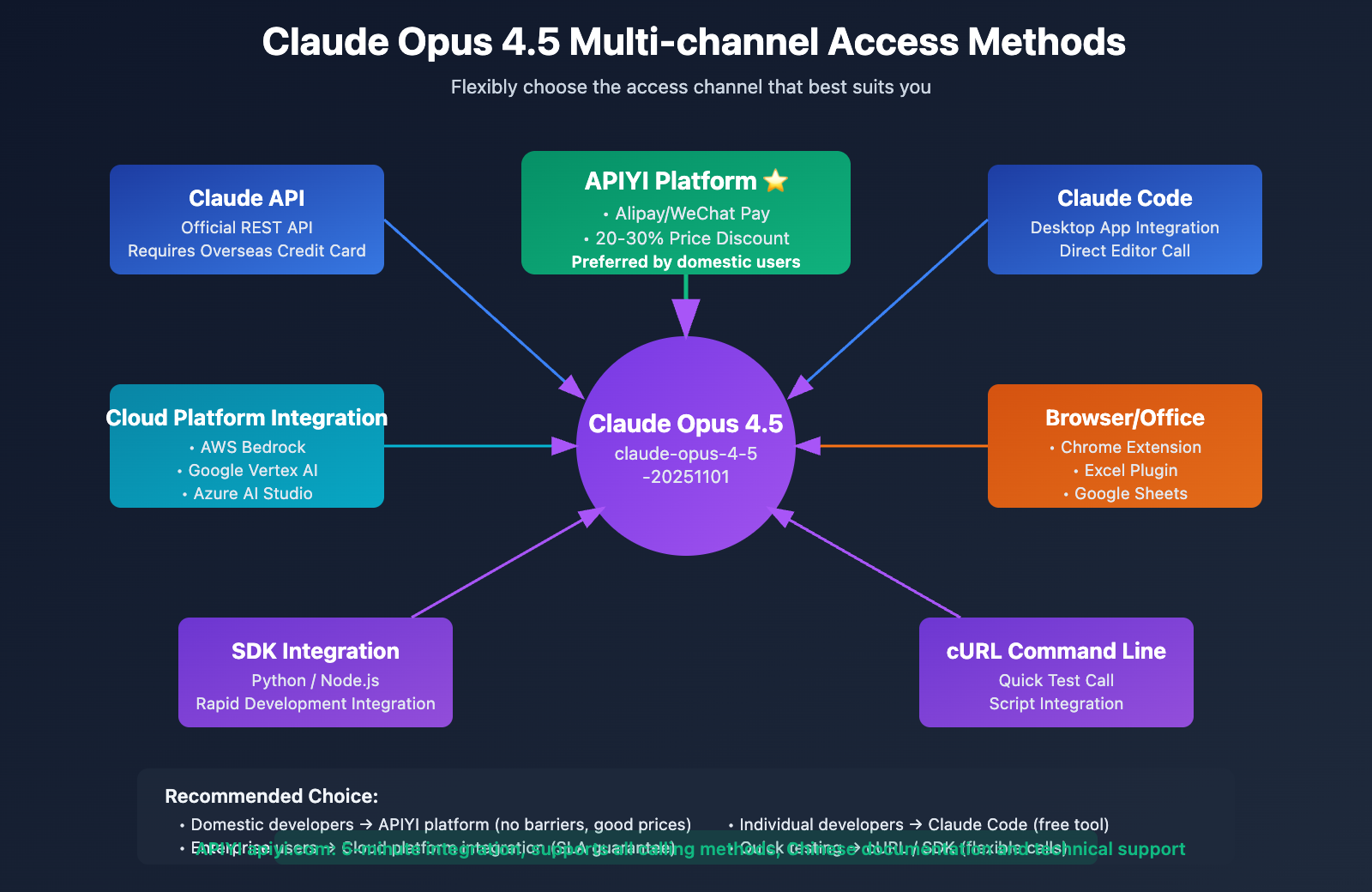
How to Call Claude Opus 4.5 via APIYI
APIYI platform launched Claude Opus 4.5 immediately on November 24, supporting standard API calls and Claude Code integration.
Method 1: Standard API Call
Python SDK Example:
import requests
# 1. Register and top up on apiyi.com to get API KEY
api_key = "your_apiyi_api_key"
# 2. Call Claude Opus 4.5
url = "https://api.apiyi.com/v1/chat/completions"
headers = {
"Authorization": f"Bearer {api_key}",
"Content-Type": "application/json"
}
payload = {
"model": "claude-opus-4-5-20251101", # Claude Opus 4.5
"messages": [
{
"role": "user",
"content": "Help me refactor this Python code, improve performance and add type annotations:\n\ndef calc(a, b, op):\n if op == 'add': return a + b\n elif op == 'sub': return a - b\n else: return None"
}
],
"max_tokens": 4096,
"temperature": 0.7,
"effort": "medium" # Effort Parameter: low/medium/high
}
response = requests.post(url, json=payload, headers=headers)
result = response.json()
print("Refactored code:")
print(result['choices'][0]['message']['content'])
Node.js SDK Example:
const axios = require('axios');
async function callClaudeOpus45() {
const response = await axios.post('https://api.apiyi.com/v1/chat/completions', {
model: 'claude-opus-4-5-20251101',
messages: [
{
role: 'user',
content: 'Analyze the performance issues of this SQL query and optimize'
}
],
max_tokens: 2048,
effort: 'high' // Use High Effort Mode for complex tasks
}, {
headers: {
'Authorization': `Bearer ${process.env.APIYI_API_KEY}`,
'Content-Type': 'application/json'
}
});
console.log(response.data.choices[0].message.content);
}
callClaudeOpus45();
Method 2: Claude Code Integration
Configuration Steps:
-
Download Claude Code Desktop Application
- Visit "Claude Code Official Website" claude.ai/download to download
-
Configure APIYI Platform Endpoint
- Open Claude Code Settings
- Find "API Configuration" option
- Set API Base URL:
https://api.apiyi.com/v1 - Enter your APIYI API KEY
-
Select Model
- Select
claude-opus-4-5-20251101from model dropdown menu - Adjust Effort Parameter (optional)
- Select
-
Start Using
- Select code in editor, right-click and choose "Ask Claude"
- Or use shortcut
Cmd/Ctrl + Kfor quick call - Claude Opus 4.5 will provide suggestions directly in the editor
Actual Experience: The combination of Claude Code + Opus 4.5 is particularly suitable for the following scenarios:
- Code completion and intelligent suggestions
- Function/class refactoring suggestions
- Code review and security checks
- Unit test generation
- Automatic docstring generation
🚀 Quick Start: Developers using Claude Opus 4.5 for the first time are recommended to top up ¥100 through APIYI apiyi.com platform, which can experience approximately 50-80 code refactoring or generation tasks, fully evaluating whether the model meets your actual needs. The platform also provides free debugging tools and API testing environment.
Method 3: cURL Command Line Call
Suitable for quick testing or integration into scripts:
curl https://api.apiyi.com/v1/chat/completions \
-H "Content-Type: application/json" \
-H "Authorization: Bearer YOUR_APIYI_API_KEY" \
-d '{
"model": "claude-opus-4-5-20251101",
"messages": [
{
"role": "user",
"content": "Explain the meaning of this regular expression: ^(?=.*[A-Z])(?=.*[0-9])(?=.*[!@#$%]).{8,}$"
}
],
"max_tokens": 1024,
"effort": "low"
}'
Claude Opus 4.5 Best Practice Recommendations
1. Fully Utilize "Effort Parameter" to Reduce Costs
Task Classification Strategy:
- Simple Tasks (code completion, syntax checking): Use
effort: low, save 40%-50% costs - Medium Tasks (function refactoring, BUG fixing): Use
effort: medium, balance quality and cost - Complex Tasks (architecture design, algorithm optimization): Use
effort: high, ensure optimal quality
Dynamic Adjustment Example:
def get_effort_level(task_type):
"""Return appropriate Effort Parameter based on task type"""
effort_map = {
'code_completion': 'low',
'simple_refactor': 'medium',
'architecture_design': 'high',
'bug_fix': 'medium',
'optimization': 'high'
}
return effort_map.get(task_type, 'medium')
# Usage Example
task = 'architecture_design'
effort = get_effort_level(task)
response = call_claude_opus_45(prompt, effort=effort)
2. Code Generation Scenario Optimization Tips
Provide Clear Context:
- Describe code's business objectives and constraints
- Provide relevant type definitions and interface specifications
- Explain performance requirements and edge cases
Leverage Long Context Capability:
- Pass complete codebase structure (through directory tree or key files)
- Include relevant dependency library documentation
- Provide project coding standards and best practices
Example Prompt:
Project Background: E-commerce system order processing module
Tech Stack: Python 3.11 + FastAPI + SQLAlchemy
Requirements:
1. Implement order creation API, support batch creation
2. Add complete type annotations (using Pydantic)
3. Include parameter validation and error handling
4. Follow RESTful API design standards
5. Add unit tests (using pytest)
Related Data Models:
[Paste SQLAlchemy model definitions for Order, Product, User]
Please generate complete implementation code.
3. Cost Control and Performance Optimization Strategy
Batch Processing:
- For multiple similar tasks, merge into one request
- Use JSON array format for batch data processing
Cache Strategy:
- Cache Claude Opus 4.5 responses for identical or similar queries
- Use Redis or local cache to reduce duplicate calls
Model Selection:
- Use Sonnet 4.5 for daily conversations and simple questions (faster and cheaper)
- Use Opus 4.5 for complex code generation and deep reasoning
- Use Haiku for ultra-high-frequency simple tasks (lowest cost)
Optimize Through APIYI Platform:
- Set monthly budget and call frequency limits
- Use platform's cost analysis tools to monitor consumption
- Apply for enterprise package to enjoy bulk discounts
💡 Selection Recommendation: If your team's monthly API call volume exceeds 1 million tokens, it is recommended to contact APIYI apiyi.com platform to apply for enterprise package. Enterprise packages provide more favorable prices, dedicated technical support and SLA guarantees, suitable for large-scale commercial applications.
Claude Opus 4.5 Common Questions and Answers
Question 1: How to Choose Between Claude Opus 4.5 and Sonnet 4.5?
Answer:
- Opus 4.5 is stronger in code generation, complex reasoning, and long task execution, with 10%-29% higher accuracy, suitable for enterprise-level applications, critical business logic, large project refactoring and other high-demand scenarios.
- Sonnet 4.5 is faster (response time about 1/3 of Opus) and cheaper (about 1/5 of Opus), suitable for daily conversations, simple Q&A, rapid prototyping.
Decision Recommendation: Choose based on task complexity and quality requirements. For core functions in production environment, prioritize Opus 4.5; for auxiliary functions and non-critical scenarios, use Sonnet 4.5 to save costs.
Question 2: Which Claude Models Does APIYI Platform Support?
Answer: APIYI apiyi.com platform fully supports Claude series models, including:
- Claude Opus 4.5 (claude-opus-4-5-20251101): Strongest code generation and reasoning capabilities
- Claude Sonnet 4.5: Balanced performance and cost, daily use
- Claude Haiku: Ultra-fast response, low-cost scenarios
- Claude 3 Series: Including Opus 3.5, Sonnet 3.5 and other historical versions
All models support standard API calls, streaming output, Claude Code integration, and fully support "Effort Parameter" configuration.
Question 3: How to Use Claude Opus 4.5 in Claude Code?
Answer:
- Download and install Claude Code desktop application
- Find "API Configuration" in Settings
- Set API Base URL to:
https://api.apiyi.com/v1 - Enter your APIYI API KEY (obtained from apiyi.com platform)
- Select
claude-opus-4-5-20251101from model dropdown menu - Start using in editor (shortcut: Cmd/Ctrl + K)
After configuration, Claude Code will automatically use APIYI platform to call Claude Opus 4.5, enjoying more favorable prices and more stable domestic access speeds.
Question 4: How to Set "Effort Parameter" Optimally?
Answer:
- Low Effort (low): Code completion, syntax checking, simple Q&A, save 40%-50% costs
- Medium Effort (medium, default): Function refactoring, BUG fixing, general code generation, balance quality and cost
- High Effort (high): Architecture design, complex algorithms, critical business logic, ensure highest quality
It is recommended to first use the default medium, and if output quality does not meet requirements, adjust to high; if tasks are simple and cost-sensitive, reduce to low.
Question 5: Which Programming Languages Does Claude Opus 4.5 Support?
Answer: Claude Opus 4.5 supports almost all mainstream programming languages, and is specifically optimized for the following languages:
- Strong Advantages: Python, TypeScript, JavaScript, Rust, Go
- Good Support: Java, C++, C#, PHP, Ruby, Swift, Kotlin
- Basic Support: SQL, Shell, Dockerfile, YAML, JSON, regular expressions
In Aider Polyglot test, leading in 7 out of 8 languages, with particularly obvious advantages in modern languages like TypeScript and Rust.
Summary and Outlook
The release of Claude Opus 4.5 marks a new stage in AI-assisted programming and enterprise automation, with core highlights including:
Technical Breakthrough:
- Performance Leap: Achieved 10%-29% significant improvement in authoritative tests such as SWE-bench, Aider, Vending-Bench
- Cost Optimization: Pricing reduced to $5/$25, combined with "Effort Parameter" can save 40%-60% actual costs
- Application Expansion: Supports multiple usage methods including API, Claude Code, cloud platforms, browser extensions, Excel integration
- Immediately Available: APIYI platform launched immediately, domestic developers can experience it right away, no overseas credit card needed
Best Practices:
- Flexibly choose Opus 4.5, Sonnet 4.5 or Haiku based on task complexity
- Fully utilize "Effort Parameter" to optimize cost and quality balance
- Enjoy more favorable prices and better technical support through APIYI platform
- Combine with Claude Code to improve daily development efficiency
Future Outlook:
Anthropic officially stated that it will continue to optimize Claude Opus 4.5's performance in the coming months, and plans to launch:
- Longer context window (possibly reaching 500K tokens)
- Enhanced multimodal capabilities (image understanding, voice interaction)
- More granular cost control options
- Enterprise-level security and compliance features
🚀 Quick Start: It is recommended to quickly experience Claude Opus 4.5 through APIYI apiyi.com platform. The platform provides out-of-the-box API interfaces, supports Alipay/WeChat Pay, and can complete the first call in 5 minutes. Top up ¥100 to experience 50+ code generation tasks, fully evaluating the model's actual value for your project.
Claude Opus 4.5 brings developers more powerful AI programming assistant capabilities. Combined with APIYI platform's convenient access and favorable prices, it will significantly improve your development efficiency and code quality!

